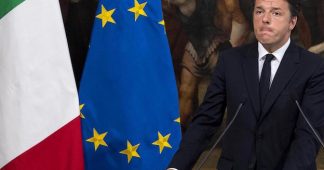By Giancarlo Bergamini
In Italy the banking crisis has been written on the wall for some time, the product of the concurrent circumstances of a weak economy (with attendant increase in the banks’ NPL [non performing loans]), the imposition by the ECB of ever tighter capital requirements along with near-zero interest rates and untimely adoption of bail-in provisions.
Brexit (but it could as well have been the exit of Mexico from Nafta, for that matter) provided the global speculators with a suitable pretext to shoot on the battered Italian Banks.
Now let us figure what the government and central bank of a sovereign country would do in order to stem the full-blown effects of a crisis such as that under way in Italy.
Number one, they would intervene in the market by purchasing massive amounts of stocks (mainly banks, but possibly also other blue chips). Needless to say, such market transactions should be carried out in a professional fashion : any market practitioner knows that to be effective asset purchases must be timed to coincide with short-coverings, with a view to magnifying the effect on prices by virtue of market squeeze.
Let me remind to the doubters that, when in 1998 the Asian financial crisis spread to Hong Kong, the Hongkong Monetary Authority accomplished just that : at one point it had bought 11 percent of the Hang Seng Index.
Number two, market operations would be coupled with a clear, explicit and unambiguous statement by the concerned government agencies/central bank to the effect that it was utterly unacceptable that the country’s banks be the punching ball of the international speculators, and all the firepower at their disposal stood ready to back up such statement.
Now if we compare the suggested course of action with the unseemly give-and-take currently ongoing between the Italian government, the Bank of Italy (provided there still is an Italian Central Bank) and their various European counterparts in Bruxelles and Frankfurt, it seems to me that we have one more reason to blame the euro that not only bears a responsibility for exacerbating the crisis of the Eurozone on account of the detrimental austerity policies embedded in its constitution, but also deprives member countries of the means to defend themselves promptly and effectively.
Finally, if all of the above sounds analogous to what the European institutions should have done (and culpably did not do) during the Eurozone’s sovereign crisis, then yes, this actually is the replay of that same song sheet.











